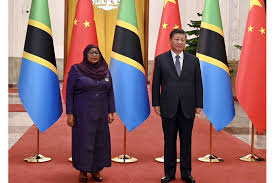Published: November 09,2022
By Staff writer

The recent visit to China by Tanzanian president SamiaSuluhu is a strong indication of existing good bilateral relations between the two countries and emphasizes the political will on both sides to strengthen their relationship.
The two leaders agreed to maintain high-level communication, and strengthen cooperation on various levels between legislative branches and political parties. They also agreed to expand trade scale, push forward infrastructure project cooperation and join hands in other fields such as green development as well as digital economy.
The Tanzanian leader has been first African head of state to be received by China after the 20th National Congress of the Communist Party of China. Chinese president Xi Jinping noted that this fully shows the closeness of China-Tanzania relations and the important status of China-Africa ties in China’s overall diplomacy.
Suluhu’s visit to China is a big demonstration of China’s strategic cooperation with China, at a time when some western countries are cajoling African countries to stop cooperation with China and Russia over allegations of “Ukraine invasion” by Russia and claimed support by China. Secondly, many countries in Africa have been hard hit by the consequences of COVID-19 pandemic and their economies have been weakened. Tanzania is likely looking at China as a reliable partner in her new journey towards economic recovery.
Xi noted that China supports Tanzania on safeguarding its sovereignty, security and development interests, and firmly supports Tanzania to explore a development path that suits itself. “China is ready to continue expanding import of specialty products from Tanzania, supporting Chinese enterprises to invest there, and providing assistance to Tanzania’s economic and social development as its capacity allows”, Xi said.
From the Tanzania-Zambia Railway built in the 1970s, to Xi’s visit in 2013, to the cooperation under the Belt and Road Initiative, the two countries have formed a long-lasting friendship and reached comprehensive cooperation, covering various fields from infrastructure construction, agriculture to culture, according to HeWenping, director of the African Studies Section at the Institute of West Asian and African Studies under the Chinese Academy of Social Sciences.
 Africa -China Review Africa -China Cooperation and Transformation
Africa -China Review Africa -China Cooperation and Transformation
